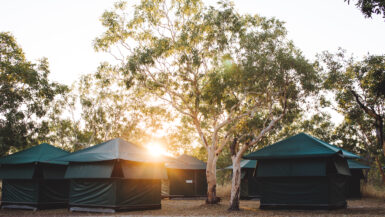Camping is an excellent way to connect with nature, and Asia is home to some of the most beautiful natural landscapes in the world. However, camping can have a negative impact on the environment if not done responsibly. Fortunately, there are many eco-friendly camping sites in Asia that offer a sustainable way to enjoy the great outdoors. From glamping in the jungles of Thailand to hiking and camping in the mountains of Bhutan, this article will highlight some of the best eco-friendly camping sites in Asia that combine conservation and adventure.
Introduction to Eco-Friendly Camping and Its Benefits
Camping is a great way to escape the hustle and bustle of city life and immerse oneself in nature. However, traditional camping practices can have a negative impact on the environment. This is where eco-friendly camping comes in.
Eco-friendly camping, also known as sustainable or green camping, involves using camping practices that are sustainable and have a minimal impact on the environment. This includes using biodegradable products, minimizing waste, and following Leave No Trace principles.
The benefits of eco-friendly camping are numerous. Firstly, it helps to preserve the natural environment for future generations to enjoy. Secondly, it reduces the carbon footprint of camping activities, which contributes to mitigating climate change. Lastly, it provides an opportunity for campers to connect with nature and learn about sustainable living practices.
In this article, we will explore the best eco-friendly camping sites in Asia. From Japan to the Philippines, we will showcase camping sites that prioritize sustainability and offer a unique camping experience.
Top Eco-Friendly Camping Sites in Asia
Asia is home to some of the most beautiful and diverse landscapes in the world, making it an ideal destination for eco-friendly camping. Here are some of the top eco-friendly camping sites in Asia that offer a unique and sustainable camping experience:
1. Khao Yai National Park, Thailand
Khao Yai National Park is a UNESCO World Heritage Site located in Thailand. It is known for its diverse wildlife, including elephants, tigers, and bears. The park offers several eco-friendly camping options, including tents and bungalows. Campers can enjoy hiking, birdwatching, and wildlife spotting while minimizing their impact on the environment.
2. Dandeli Wildlife Sanctuary, India
Dandeli Wildlife Sanctuary is located in the Western Ghats of India and is home to a variety of wildlife, including tigers, leopards, and elephants. The sanctuary offers eco-friendly camping options, including tents and cottages. Campers can enjoy activities such as kayaking, trekking, and birdwatching while minimizing their impact on the environment.
3. Mount Kinabalu, Malaysia
Mount Kinabalu is the highest mountain in Malaysia and is located in Kinabalu Park, a UNESCO World Heritage Site. The park offers eco-friendly camping options, including tents and lodges. Campers can enjoy hiking, birdwatching, and stargazing while minimizing their impact on the environment.
4. Yakushima Island, Japan
Yakushima Island is a UNESCO World Heritage Site located in Japan. It is known for its ancient cedar forests and diverse wildlife, including monkeys and deer. The island offers several eco-friendly camping options, including tents and lodges. Campers can enjoy hiking, hot springs, and wildlife spotting while minimizing their impact on the environment.
5. Pulau Macan, Indonesia
Pulau Macan is a small island located near Jakarta, Indonesia. It is known for its crystal clear waters and coral reefs. The island offers eco-friendly camping options, including tents and bungalows. Campers can enjoy snorkeling, kayaking, and beach activities while minimizing their impact on the environment.
These are just a few of the top eco-friendly camping sites in Asia. By choosing to camp sustainably, you can enjoy the beauty of nature while minimizing your impact on the environment.
Eco-Friendly Camping in Japan
Japan is a country known for its natural beauty and unique culture, making it an ideal destination for eco-friendly camping. Here are some of the top eco-friendly camping sites in Japan that offer a sustainable and unforgettable camping experience:
1. Kirigamine Highland, Nagano Prefecture
Kirigamine Highland is a high-altitude plateau located in the Nagano Prefecture of Japan. It is known for its stunning views of the Japanese Alps and is a popular destination for hiking and camping. The site offers eco-friendly camping options, including campsites with fireplaces and rental tents made from recycled materials.
2. Kankakei Gorge, Shodoshima Island
Shodoshima Island is located in the Seto Inland Sea of Japan and is known for its stunning natural landscapes. The Kankakei Gorge is a popular destination for camping and hiking, offering eco-friendly camping options such as rental tents and cabins made from sustainable materials.
3. Yakushima Island, Kagoshima Prefecture
Yakushima Island is a UNESCO World Heritage Site located in the Kagoshima Prefecture of Japan. It is known for its ancient cedar forests and diverse wildlife, including monkeys and deer. The island offers several eco-friendly camping options, including campsites with composting toilets and rental tents made from recycled materials.
4. Lake Shikotsu, Hokkaido Prefecture
Lake Shikotsu is a volcanic lake located in the Hokkaido Prefecture of Japan. It is known for its crystal-clear waters and stunning scenery. The lake offers eco-friendly camping options, including campsites with composting toilets and rental cabins made from sustainable materials.
5. Oze National Park, Gunma and Fukushima Prefectures
Oze National Park is located in the Gunma and Fukushima Prefectures of Japan and is known for its stunning alpine scenery and unique wildlife. The park offers eco-friendly camping options, including campsites with composting toilets and rental tents made from sustainable materials.
These are just a few of the top eco-friendly camping sites in Japan. By choosing to camp sustainably, you can enjoy the beauty of Japan’s natural landscapes while minimizing your impact on the environment.
Eco-Friendly Camping in Thailand
Thailand is a popular tourist destination known for its beautiful beaches, tropical climate, and rich culture. It is also home to several eco-friendly camping sites that offer a unique and sustainable camping experience. Here are some of the top eco-friendly camping sites in Thailand:
1. Khao Yai National Park
Khao Yai National Park is a UNESCO World Heritage Site located in Thailand. It is known for its diverse wildlife, including elephants, tigers, and bears. The park offers several eco-friendly camping options, including tents and bungalows. Campers can enjoy hiking, birdwatching, and wildlife spotting while minimizing their impact on the environment.
2. Doi Inthanon National Park
Doi Inthanon National Park is located in Chiang Mai, Thailand, and is known for its stunning natural beauty and diverse wildlife. The park offers eco-friendly camping options, including tents and bungalows. Campers can enjoy hiking, birdwatching, and wildlife spotting while minimizing their impact on the environment.
3. Koh Surin National Park
Koh Surin National Park is located in the Andaman Sea of Thailand and is known for its stunning coral reefs and diverse marine life. The park offers eco-friendly camping options, including tents and bungalows. Campers can enjoy snorkeling, diving, and beach activities while minimizing their impact on the environment.
4. Khao Sok National Park
Khao Sok National Park is located in southern Thailand and is known for its stunning limestone cliffs, caves, and waterfalls. The park offers eco-friendly camping options, including tents and bungalows. Campers can enjoy hiking, kayaking, and wildlife spotting while minimizing their impact on the environment.
5. Koh Yao Noi Island
Koh Yao Noi Island is located in the Phang Nga Province of Thailand and is known for its stunning natural beauty and quiet, laid-back atmosphere. The island offers eco-friendly camping options, including tents and bungalows. Campers can enjoy kayaking, snorkeling, and beach activities while minimizing their impact on the environment.
These are just a few of the top eco-friendly camping sites in Thailand. By choosing to camp sustainably, you can enjoy the beauty of Thailand’s natural landscapes while minimizing your impact on the environment.
Eco-Friendly Camping in Indonesia
Indonesia is an archipelago located in Southeast Asia and is known for its stunning natural beauty, rich culture, and diverse wildlife. It is also home to several eco-friendly camping sites that offer a unique and sustainable camping experience. Here are some of the top eco-friendly camping sites in Indonesia:
1. Pulau Macan
Pulau Macan is a small island located near Jakarta, Indonesia. It is known for its crystal clear waters and coral reefs. The island offers eco-friendly camping options, including tents and bungalows. Campers can enjoy snorkeling, kayaking, and beach activities while minimizing their impact on the environment.
2. Gunung Gede Pangrango National Park
Gunung Gede Pangrango National Park is located in West Java, Indonesia, and is known for its stunning natural beauty and diverse wildlife. The park offers eco-friendly camping options, including tents and bungalows. Campers can enjoy hiking, birdwatching, and wildlife spotting while minimizing their impact on the environment.
3. Bawah Reserve
Bawah Reserve is a private island located in the Anambas Islands of Indonesia. It is known for its stunning natural beauty and pristine beaches. The island offers eco-friendly camping options, including tents and villas made from sustainable materials. Campers can enjoy snorkeling, diving, and beach activities while minimizing their impact on the environment.
4. Togean Islands
The Togean Islands are located in Sulawesi, Indonesia, and are known for their stunning coral reefs and diverse marine life. The islands offer eco-friendly camping options, including tents and bungalows. Campers can enjoy snorkeling, diving, and beach activities while minimizing their impact on the environment.
5. Mount Rinjani National Park
Mount Rinjani National Park is located in Lombok, Indonesia, and is known for its stunning natural beauty and diverse wildlife. The park offers eco-friendly camping options, including tents and bungalows. Campers can enjoy hiking, birdwatching, and wildlife spotting while minimizing their impact on the environment.
These are just a few of the top eco-friendly camping sites in Indonesia. By choosing to camp sustainably, you can enjoy the beauty of Indonesia’s natural landscapes while minimizing your impact on the environment.
Eco-Friendly Camping in India
India is a country known for its diverse landscapes, rich culture, and ancient history. It is also home to several eco-friendly camping sites that offer a unique and sustainable camping experience. Here are some of the top eco-friendly camping sites in India:
1. Dandeli Wildlife Sanctuary
Dandeli Wildlife Sanctuary is located in the Western Ghats of India and is home to a variety of wildlife, including tigers, leopards, and elephants. The sanctuary offers eco-friendly camping options, including tents and cottages. Campers can enjoy activities such as kayaking, trekking, and birdwatching while minimizing their impact on the environment.
2. Sariska National Park
Sariska National Park is located in the Alwar district of Rajasthan, India, and is known for its diverse wildlife, including tigers, leopards, and deer. The park offers eco-friendly camping options, including tents and cottages. Campers can enjoy wildlife safaris, birdwatching, and hiking while minimizing their impact on the environment.
3. Ranthambore National Park
Ranthambore National Park is located in the Sawai Madhopur district of Rajasthan, India, and is known for its diverse wildlife, including tigers, leopards, and deer. The park offers eco-friendly camping options, including tents and cottages. Campers can enjoy wildlife safaris, birdwatching, and hiking while minimizing their impact on the environment.
4. Kudremukh National Park
Kudremukh National Park is located in the Western Ghats of Karnataka, India, and is known for its stunning natural beauty and diverse wildlife. The park offers eco-friendly camping options, including tents and cottages. Campers can enjoy hiking, birdwatching, and wildlife spotting while minimizing their impact on the environment.
5. Bandhavgarh National Park
Bandhavgarh National Park is located in the Umaria district of Madhya Pradesh, India, and is known for its diverse wildlife, including tigers, leopards, and deer. The park offers eco-friendly camping options, including tents and cottages. Campers can enjoy wildlife safaris, birdwatching, and hiking while minimizing their impact on the environment.
These are just a few of the top eco-friendly camping sites in India. By choosing to camp sustainably, you can enjoy the beauty of India’s natural landscapes while minimizing your impact on the environment.
Eco-friendly camping in China
China has a diverse landscape, ranging from mountains to lakes, forests to deserts, which makes it an ideal destination for eco-friendly camping. The country has made significant progress in promoting eco-tourism in recent years, and there are several eco-friendly camping sites in China that offer a unique experience to campers.
One of the best eco-friendly camping sites in China is the Moganshan Mountain Camp, located in Zhejiang Province. This camp is surrounded by bamboo forests, tea plantations, and streams, providing a serene and peaceful environment for campers. The campsite is equipped with eco-friendly facilities such as composting toilets, solar-powered showers, and recycled water systems, which minimize the impact on the environment.
Another popular eco-friendly camping site in China is the Qingyuan Green Valley Camp, located in Guangdong Province. This campsite is situated in a valley surrounded by mountains and a river, providing a picturesque setting for campers. The campsite has adopted sustainable practices such as using solar power, recycling waste, and using natural materials for construction.
The Yunnan Province is another destination for eco-friendly camping in China. The province is home to several eco-friendly camping sites, such as the Shangri-La Camp and the Tiger Leaping Gorge Camp. These campsites offer stunning views of the mountains, forests, and rivers, providing a perfect getaway for nature lovers. The campsites have adopted sustainable practices such as using solar power, composting toilets, and recycling waste.
China’s commitment to eco-tourism has led to the development of several eco-friendly camping sites across the country. These campsites not only provide a unique camping experience but also promote sustainable practices that minimize the impact on the environment. Campers can enjoy the beauty of China’s natural landscapes while contributing to the preservation of the environment.
Eco-friendly camping in Vietnam
Vietnam is a beautiful country that boasts of stunning natural landscapes, including mountains, forests, and beaches. The country has several eco-friendly camping sites that provide an opportunity for campers to enjoy the beauty of nature while minimizing their impact on the environment.
One of the best eco-friendly camping sites in Vietnam is the Cat Tien National Park, located in the south of the country. The park is home to a diverse range of flora and fauna, including elephants, bears, and primates. The camping site is equipped with eco-friendly facilities such as composting toilets, solar-powered showers, and recycling systems, which minimize the impact on the environment.
Another popular eco-friendly camping site in Vietnam is the Phu Quoc Island, located in the Gulf of Thailand. The island is known for its pristine beaches and crystal-clear waters, providing a perfect setting for camping. The camping site is equipped with eco-friendly facilities such as solar-powered lighting, composting toilets, and recycling systems, which minimize the impact on the environment.
The Ba Be National Park is another destination for eco-friendly camping in Vietnam. The park is located in the north of the country and is home to several lakes, caves, and waterfalls. The camping site is equipped with eco-friendly facilities such as solar-powered lighting, composting toilets, and recycling systems, which minimize the impact on the environment.
Vietnam’s commitment to eco-tourism has led to the development of several eco-friendly camping sites across the country. These campsites not only provide a unique camping experience but also promote sustainable practices that minimize the impact on the environment. Campers can enjoy the beauty of Vietnam’s natural landscapes while contributing to the preservation of the environment.
Conclusion
In conclusion, eco-friendly camping is a sustainable way to enjoy the beauty of nature while minimizing the impact on the environment. Asia has several eco-friendly camping sites that offer a unique experience to campers. From the bamboo forests of China to the pristine beaches of Thailand, there is something for everyone. By choosing to camp at eco-friendly sites, we can contribute to the preservation of our natural environment for future generations to enjoy.
Eco-friendly camping in the Philippines
The Philippines is a tropical paradise that is home to several eco-friendly camping sites. The country’s natural beauty, including its pristine beaches, crystal-clear waters, and lush forests, provides a perfect setting for eco-friendly camping.
One of the best eco-friendly camping sites in the Philippines is the Masungi Georeserve, located in Rizal Province. The camping site is situated amidst limestone formations, providing a unique setting for campers. The campsite has adopted sustainable practices such as composting toilets, recycling waste, and using solar power.
Another popular eco-friendly camping site in the Philippines is the Anawangin Cove, located in Zambales Province. The camping site is nestled amidst pine trees and a pristine beach, providing a serene and peaceful environment for campers. The campsite has adopted sustainable practices such as using solar power, composting toilets, and recycling waste.
The Sagada Eco Valley Camp is another destination for eco-friendly camping in the Philippines. The campsite is located in the Cordillera Mountains and is surrounded by rice terraces and waterfalls. The campsite has adopted sustainable practices such as using solar power, composting toilets, and recycling waste.
The Philippines’ commitment to eco-tourism has led to the development of several eco-friendly camping sites across the country. These campsites not only provide a unique camping experience but also promote sustainable practices that minimize the impact on the environment.
Conclusion
In conclusion, eco-friendly camping is a sustainable way to enjoy the beauty of nature while minimizing the impact on the environment. The Philippines has several eco-friendly camping sites that offer a unique experience to campers. From the limestone formations of Masungi Georeserve to the rice terraces of Sagada Eco Valley Camp, there is something for everyone. By choosing to camp at eco-friendly sites, we can contribute to the preservation of our natural environment for future generations to enjoy.





Leave a reply